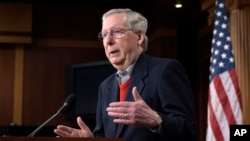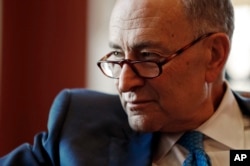Senate Majority Leader Mitch McConnell is rejecting bipartisan calls for a special committee to investigate Russian interference in the U.S. election, which American intelligence says was aimed in part at helping Republican Donald Trump defeat Democrat Hillary Clinton.
The likely meddling by Russia "is a serious issue, but it doesn't require a select committee,'' said McConnell, R-Ky. The Senate intelligence committee is able to investigate the matter, he added.
CIA Director John Brennan has said the intelligence community is in agreement that Russia tried to interfere in the U.S. presidential election, although there's no evidence Moscow succeeded in helping Trump win.
“There's no question that the Russians were messing around in our election,” McConnell told Kentucky Educational Television on Monday night. “It is a matter of genuine concern and it needs to be investigated.”
Still, McConnell said the issue should be investigated in “regular order” by the Senate intelligence panel, which is “fully capable of handling this.”
McConnell's comments put him at odds with Arizona Sen. John McCain and other Republicans who have joined with incoming Senate Democratic leader Chuck Schumer in calling for a special committee to investigate efforts by Russia, China and Iran to interfere in U.S. elections.
A select committee is a high-profile panel created by congressional leaders that taps lawmakers from a variety of committees to focus on a single issue, such as Watergate or the Iran-contra arms deal.
McCain, chairman of the Senate Armed Services Committee, said Russian interference in the election threatens to “destroy democracy,” adding that a select committee is needed to find out exactly what Russia did and what effect it had on the election.
“We need to get to the bottom of this,” McCain said. “We need to find out exactly what was done and what the implications of the attacks were, especially if they had an effect on our election.”
He said: “There's no doubt they were interfering and no doubt that it was cyberattacks. The question now is how much and what damage and what should the United States of America do? And so far, we have been totally paralyzed.”
Trump has called reports of Russian hacking “ridiculous,” and his transition team dismissed the CIA assessment, saying it was the work of the same people who claimed Iraq had weapons of mass destruction before the U.S. invaded.
Schumer, D-N.Y., said in a statement that the investigation must be bipartisan.
“We don't want this investigation to be political like the Benghazi investigation,” he said. “We don't want it to just be finger pointing at one person or another.” Schumer added: “We want to find out what the Russians are doing to our political system and what other foreign governments might do to our political system. And then figure out a way to stop it.”
McCain, Schumer and other senators say a select committee is needed to “reconcile contradictory information” and give the issue needed focus.
In the interview with KET's Bill Goodman, McConnell spoke of his surprise at the election's outcome.
“I thought we'd come up short'' in the Senate, McConnell said. “And I didn't think President Trump had a chance of winning.”
Trump won in part because he was able to connect with rural voters in states such as Michigan, Pennsylvania and Wisconsin that had previously voted for Democrats, McConnell said.
“Trump was able to convey — oddly enough a message from a billionaire who lives in Manhattan — a genuine concern for people who felt kind of left off, who felt offended by all the political correctness they see around them,'' he said.





